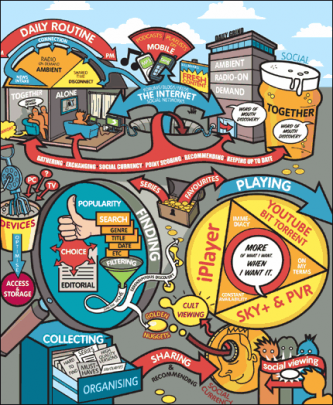The theory of Uses and Gratifications was created in 1974
when Blulmer and Katz brought up the subject on how the use of media caused
gratification of the social or psychological needs of an individual. The 4 main
areas in which the media does this are Personal Identity, Social Interaction,
Diversion and Information.
 There are many different ways that the public use the media
for personal identity. Characters on TV shows or people in magazines act as
models for behaviour therefore supporting the personal ethics and behaviour of
an individual. For example, people who read a pop music magazine will begin to
dress like and, to some amount, act like the people featured in the magazine.
The media is also said to give people an understanding into themselves, this
could be by reading an article about a family member passing away and learning
how you are expected to react if this same incident occurs in your life.
There are many different ways that the public use the media
for personal identity. Characters on TV shows or people in magazines act as
models for behaviour therefore supporting the personal ethics and behaviour of
an individual. For example, people who read a pop music magazine will begin to
dress like and, to some amount, act like the people featured in the magazine.
The media is also said to give people an understanding into themselves, this
could be by reading an article about a family member passing away and learning
how you are expected to react if this same incident occurs in your life.
The public can also use the media for social interaction.
Television shows often have exaggerated versions of events likely to happen in
real life, which can gains insight into the lives of other people giving the
viewer a sense of social empathy with the characters. All forms of media stem
questions and topics of debate; this means that they create informal topics for
social interaction giving people something in common to talk about. Also,
characters in long running television shows and bands and artists featured
frequently in magazine interviews give the reader/watcher a feeling that they
know them well and become almost ‘friends’.
Magazines and Television provide a change from daily
routine. For most people they are a form of relaxation acting as a diversion
from real life issues and problems that an individual faces. They show case the
issues of other people so for a while you can forget about your own. They also
provide emotional release such as crying or laughter, which some people don’t
do enough of in daily life that can help to reduce their stress levels.
Lastly, the media can be used to provide information. The
news tells people what is going on in the world from day to day and Magazines
provide information about upcoming gigs, album reviews and artists, classic and
contemporary. This makes the audience feel involved and up to date with what is
happening.
No comments:
Post a Comment